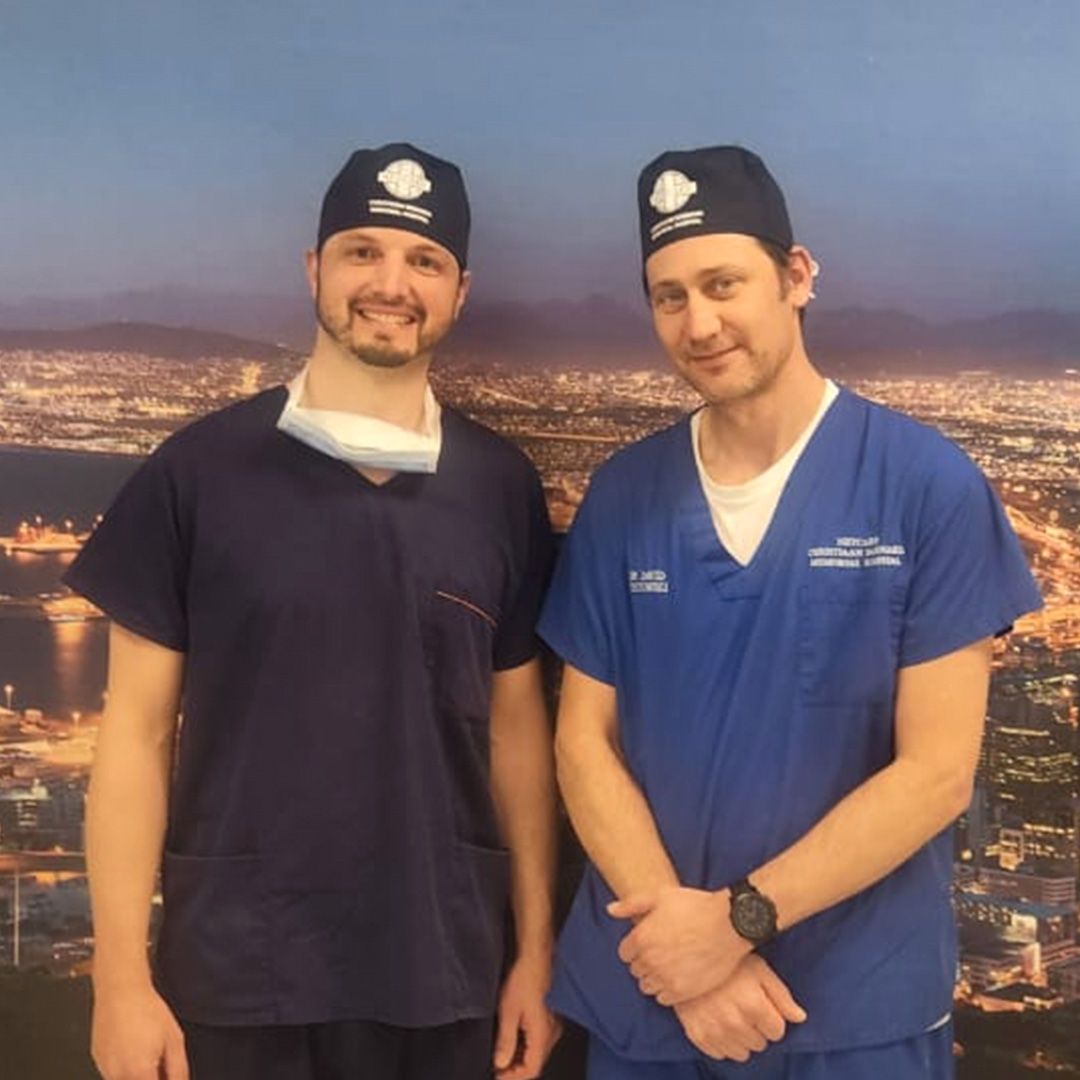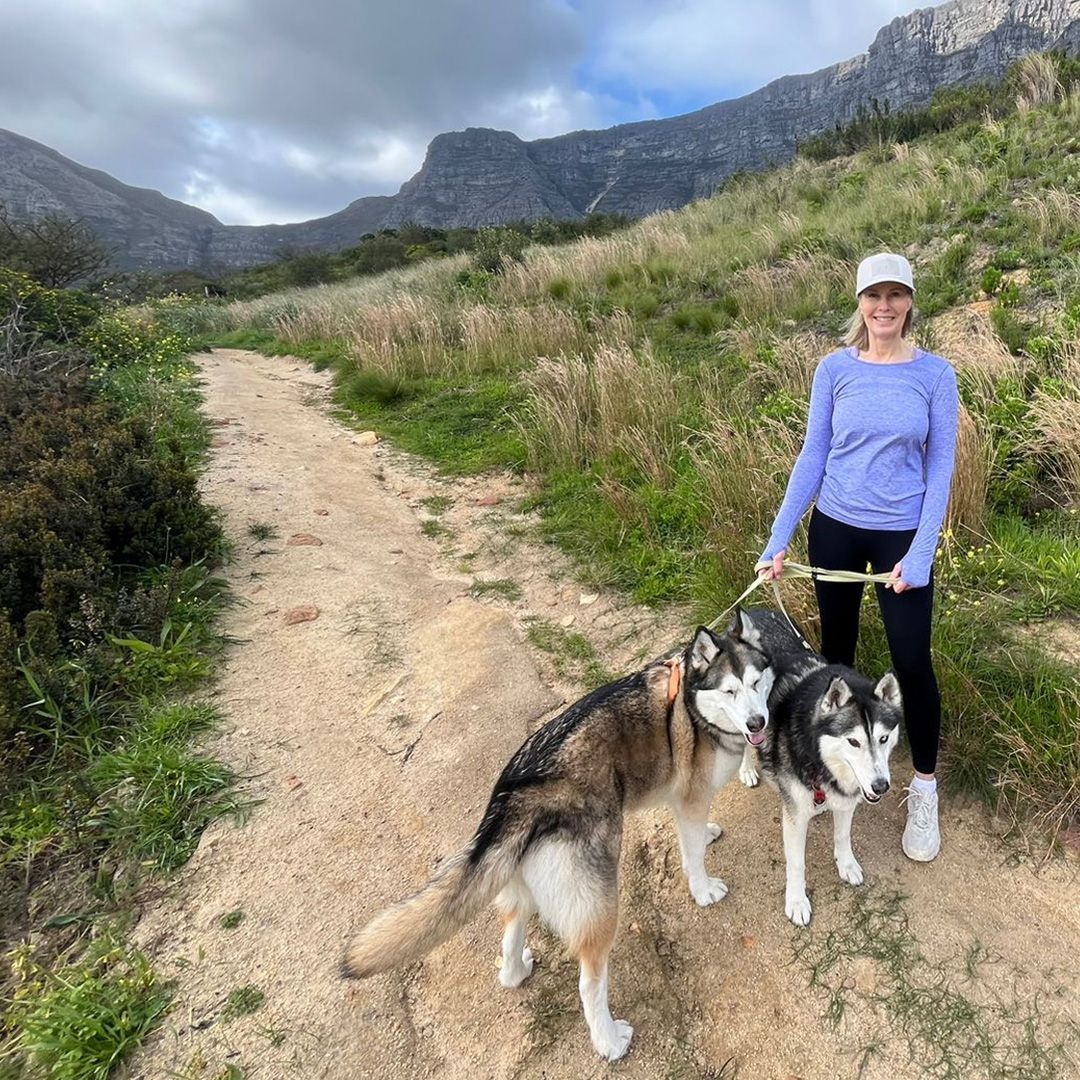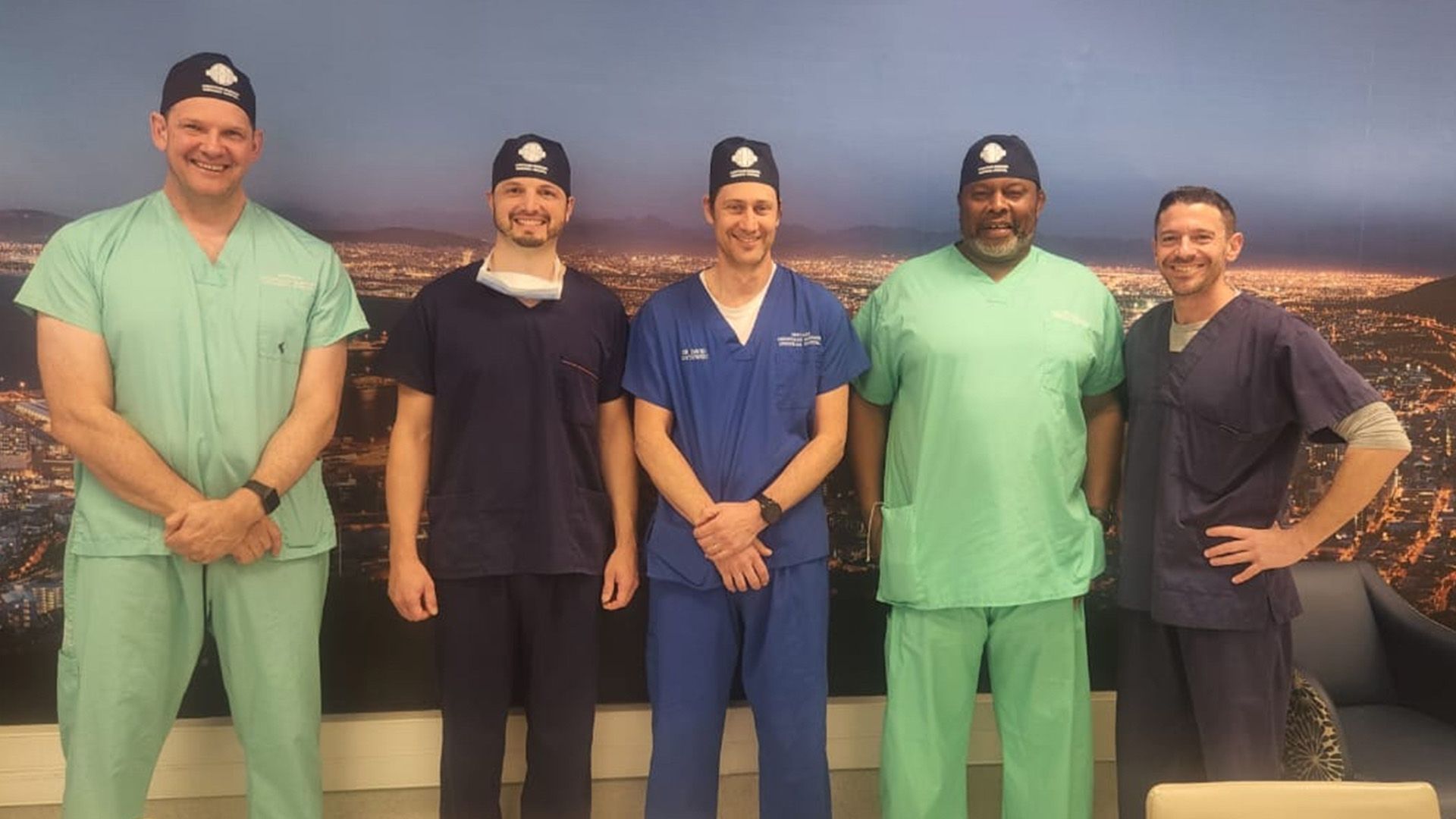International collaboration for keyhole spinal surgery
Left to right – Head of neurosurgery at Stellenbosch University, Professor Ian Vlok, is pictured with visiting German neurosurgeon Dr Vincent Hagel, neurosurgeon Dr David Roytowsky, head of neurosciences at Wits University, Professor John Ouma and anaesthetist Dr Nick Meyersfeld.
Building local expertise in advanced endoscopic techniques
A patient is recovering well after a groundbreaking advanced endoscopic spinal procedure at Netcare Christiaan Barnard Memorial Hospital, where German and South African neurosurgeons collaborated to repair a cerebrospinal fluid leak caused by an extremely rare condition.
Carmen Dippenaar, a 52-year-old lawyer living in Gardens, Cape Town, developed a dural tear on her lower thoracic spine caused by a sharp bone spur on a calcified intervertebral disc earlier this year, causing her intense pain that rendered her virtually bedridden for three months.
“After developing severe headaches that didn’t respond to any pain medication, Mrs Dippenaar had previously undergone two blind epidural blood patches and two targeted epidural blood patches, which failed to resolve the dural tear as the bone spur kept piercing the nervous system’s protective membrane known as the dura, causing her cerebrospinal fluid, which acts as a shock absorber for the brain, to lose pressure. This was causing the brain to sag in the skull, pressing on the brainstem resulting in debilitating pain,” says neurosurgeon Dr David Roytowski.
“The cause and location of Mrs Dippenaar’s dural tear made this a very rare pathology. It was situated directly anterior (in front) to the spinal cord. Accessing this area is particularly difficult and traditionally requires much more invasive surgery, involving collapsing one of the lungs, cutting through the diaphragm and opening the T12 vertebra to access the site of the dural tear.
“Yet today there are endoscopic spinal techniques that are becoming established elsewhere in the world that show great promise for such procedures, reducing risks associated with open surgery. There are a few South African centres that offer endoscopic spinal surgery, but this is mainly limited to surgery of the lumbar spine, an area which carries much less risk of neurological injury,” he says.
Dr Vincent Hagel, a leading senior physician at the Spine Centre of the Asklepios Hospital in Lindau, Germany, renowned for his expertise in endoscopic spine surgery in the thoracic spine, travelled to South Africa to perform the procedure with Dr Roytowski.
Dr Roytowski hailed the academic support for advanced endoscopic spinal techniques, with the head of neurosurgery at Stellenbosch University, Professor Ian Vlok, and the head of neurosciences at Wits University, Professor John Ouma, discussing the case with the German expert and observing the pioneering procedure at Netcare Christiaan Barnard Memorial Hospital.
In addition, Royal Ortho, a local medical devices company specialising in training surgeons in endoscopic spine surgery, has played a vital role in expanding access to this minimally invasive technique. They not only provided significant support to the surgical team but also facilitated and funded Dr Vincent Hagel's trip to South Africa.
“The benefit of the endoscopic transforaminal approach is that we can precisely access the point on the side of the spinal column to remove the small, calcified disc herniation that is causing the cerebrospinal fluid leak without having to move the organs and retract the spinal cord,” Dr Hagel says.
“Although this can be a challenging procedure if using the traditional techniques, it is something I regularly do endoscopically in Germany for treating disc herniations. Coupled with my experience in treating thoracic spinal patients, this is very familiar ground to me, although it is such an unusual presentation of the pathology,” he explains.
Endoscopic spinal surgery is an emerging super-speciality in South Africa, which considerably reduces the physical trauma associated with open surgery, enabling shorter hospital stays and quicker return to daily activities. A small puncture of approximately 8mm is made in the skin, and a slender instrument called an endoscope with a light and a tiny camera is inserted to enable neurosurgeons to perform procedures through a ‘keyhole’ approach rather than exposing a large surgical site.
“This means that we can avoid the need for a large incision on the person’s back, and there is no longer a need to fracture the vertebra, which would have to be repaired and supported with metalwork. Instead, endoscopic procedures offer a very targeted approach, allowing for the natural spinal column to remain intact,” Dr Roytowski explains.

Dr Vincent Hagel, a leading senior physician at the Spine Centre of the Asklepios Hospital in Lindau, Germany, travelled to South Africa to perform a groundbreaking advanced endoscopic spinal procedure at Netcare Christiaan Barnard Memorial Hospital, where German and South African neurosurgeons collaborated to repair a cerebrospinal fluid leak caused by an extremely rare condition. Here he is photographed with neurosurgeon Dr David Roytowski.

Back on her feet and back on the mountain! After undergoing a groundbreaking advanced endoscopic spinal procedure at Netcare Christiaan Barnard Memorial Hospital, where German and South African neurosurgeons collaborated to repair a cerebrospinal fluid leak caused by an extremely rare condition, Carmen Dippenaar cherishes every step here while walking Maddie and Noah on Table Mountain.
In a procedure lasting three hours, the doctors exposed the dural defect, shaved off and removed the sharp bone spur that had been piercing the dura and patched the leaking area.
Mrs Dippenaar says she was amazed that she was able to get out of bed the day following her procedure and walk around with little to no pain.
“At its worst, for a period of three months (March, April and May) I couldn’t be upright for longer than 10 minutes at a time without feeling the worst headache I have ever experienced – I can barely describe how debilitating it was, like my brain was in a vice and being squeezed. There were other symptoms too – dizziness, nausea and tinnitus. I could not physically drive into work or sit at a desk, I could not exercise at all, not even go for a short walk and I couldn’t be upright long enough to do ordinary activities like shower, socialise or have a meal seated at a table. There were some very dark moments. I wondered if I would ever be able to resume a normal life again” she recalls.
“I spent one night in high care and one night in a general ward, and then I could return home. Within ten days of the endoscopic spinal intervention, I was able to return to everyday life.
“I have been looking forward to exercising again after living with the leak for six months, three of which were spent lying down in bed. I am so grateful to the doctors for making it possible for me to have this minimally invasive procedure. All the specialists were exceptional and went above and beyond what was expected of them.
From Dr Marc Jordaan, the neuroradiologist at Morton and Partners who located the exact site of my dural leak and performed two targeted epidural blood patches, to Dr Roytowski for explaining the options available to me, for hearing me and persisting in finding this innovative approach and Dr Hagel for coming all the way from Germany, as well as the anaesthetist, Dr Nick Meyersfeld, who performed the initial two blind blood patches and continued to be involved in my care, even though he wasn’t required to, as well as performing the anaesthetic for the endoscopic procedure.”
Shadeeran Govender, general manager of Netcare Christiaan Barnard Hospital, thanked Dr Hagel for sharing his expertise with local neurosurgeons.
“The benefits of hosting an eminent international expert and local medical academic leaders in the field in our facility are that it enables these super specialised skills to be developed and assist more patients more safely in the future with the structured approach to endoscopic surgery. We heartily congratulate Dr Hagel, Dr Roytowski, and the team on successfully completing this landmark procedure,” Govender concluded.













